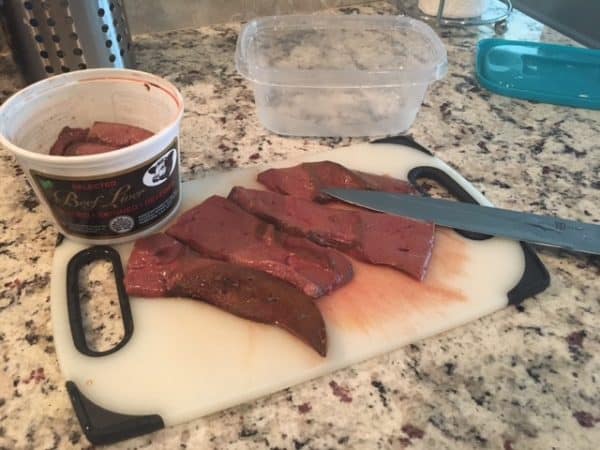How long can you keep the raw liver in the fridge?
Raw liver is known as a natural detoxifier and has been used for centuries to treat various ailments. But did you know that it’s also great for weight loss?
Raw liver is rich in enzymes, vitamins, minerals, and other nutrients that promote good health. It contains high levels of vitamin B6, iron, copper, zinc, and selenium. In addition, it helps boost metabolism and burn fat.
You can easily get raw liver from local markets or online stores.
The raw liver has become quite trendy lately, especially amongst health-conscious individuals. The reason why? Raw liver contains high levels of nutrients and minerals such as iron, zinc, copper, calcium, magnesium, vitamin B12, folic acid, riboflavin, niacin, pantothenic acid, phosphorus, potassium, manganese, selenium, iodine, vitamins D and K2, and omega 3 fatty acids.
However, the downside is that raw liver is highly perishable and should be stored properly. How long can you store raw liver in the refrigerator?
For optimal freshness, raw liver should be refrigerated within 24 hours after purchase. If you don’t plan to consume it immediately, then you can freeze it for later use.
How long can you keep the raw liver in the fridge?
The best way to preserve the quality of your raw liver is by keeping it in the freezer. This will ensure that the liver remains frozen until you are ready to eat it. You can either thaw the liver before eating it or simply heat it up in the microwave.
If you prefer to keep the liver in the refrigerator, then you must make sure that the temperature does not exceed 37 degrees Celsius (98.6 degrees Fahrenheit). Otherwise, the liver may start to spoil.

While storing raw liver in the refrigerator, you need to take note of the following:
• Make sure that the container is airtight.
• Keep the lid tightly closed so that no moisture gets inside.
• Store the raw liver in an area with low humidity.
• Avoid storing the liver near any strong odors.
• Don’t expose the liver to direct sunlight.
How do I cook raw liver?
Cooking raw liver is simple. All you have to do is boil it. Boiling is recommended because this method preserves its nutritional value. However, if you want to add flavor to your cooked liver, then you can sauté it in oil or butter.
When boiling raw liver, you can choose between two methods:
1) Boil the liver in water.
2) Boil the liver on top of vegetables.
Boiling the liver in water is the simplest option. To do this, just place the raw liver into a pot filled with enough water. Bring the water to a boil and let it simmer for 10 minutes. After cooking, drain the excess liquid and serve the liver hot.
Boiling the liver on top of veggies is another popular way to prepare raw liver. For this method, first chop the raw liver into small pieces. Then, combine them with some chopped onions, carrots, celery, and garlic. Add salt and pepper to taste. Next, pour vegetable oil over the mixture, followed by 1 cup of chicken stock. Cover the pan and allow the mixture to simmer for about 30 minutes. Once done, remove the cover and stir well. Serve the liver hot.
Can I drink raw liver?
Yes! Drinking raw liver is perfectly safe. In fact, raw liver contains certain enzymes which help break down proteins. These enzymes also prevent the formation of carcinogenic compounds. Therefore, drinking raw liver is beneficial for people who suffer from cancer.
You can enjoy raw liver as part of a healthy diet. It’s great when eaten together with other foods such as eggs, fish, and meat.
What happens if I accidentally eat raw liver?
Accidentally consuming raw liver can lead to severe health problems. The most common side effects include nausea, vomiting, diarrhea, and abdominal pain. If these symptoms persist, then you should seek medical attention immediately.
How to store raw liver?
Raw liver should be stored in the freezer. This ensures that the liver remains fresh and free from bacteria. Also, freezing prevents the growth of microorganisms.
However, you shouldn’t freeze the liver for longer than 6 months. During this period, the liver will lose its nutrients.
Is there anything else I should know about raw liver?
If you’re planning to consume raw liver, then you should avoid eating uncooked meats. Raw liver is highly perishable; therefore, it should only be consumed within 7 days after purchase.
Also, make sure that the container used to transport the liver is sealed tight. Otherwise, the liver may absorb harmful chemicals present in the environment.
How to freeze raw liver?
To freeze raw liver, simply wrap it tightly in aluminum foil. Make sure that the package is airtight. Place the package in the freezer and leave it there for at least 24 hours. You can use frozen liver anytime you need it.
Do not thaw the liver before using it. Instead, defrost it in the refrigerator overnight.
What happens if you leave raw meat in the fridge?
Leaving raw meat in the fridge can cause food poisoning. The bacteria present in the meat can multiply rapidly once they are exposed to an oxygen-rich environment.
This means that the bacteria can contaminate any other food items kept in the same area. As a result, you might get sick.
Can you store raw meat in aluminum foil?
It depends on how much time you want to preserve the meat. However, storing raw meat in aluminum foil does not guarantee that your meal won’t spoil. Aluminum has no antimicrobial properties.
Therefore, it cannot kill or inhibit the growth of bacteria.

Can I leave raw meat in the fridge for a week?
No. Leaving raw meat in the fridge is unsafe because it exposes the meat to high levels of bacteria.
The bacteria can grow quickly once they are exposed to oxygen. This means that the bacteria can infect other foods stored in the same area.
As a result, you might end up getting sick.
How to use frozen and thawed livers?
Frozen and thawed livers have lost their nutritional value. They contain less protein and more fat.
In addition, the texture of the liver becomes mushy. Therefore, you have to cook them before consuming them.
Cooking the liver helps retain its original flavor. It also makes the liver easier to digest.
